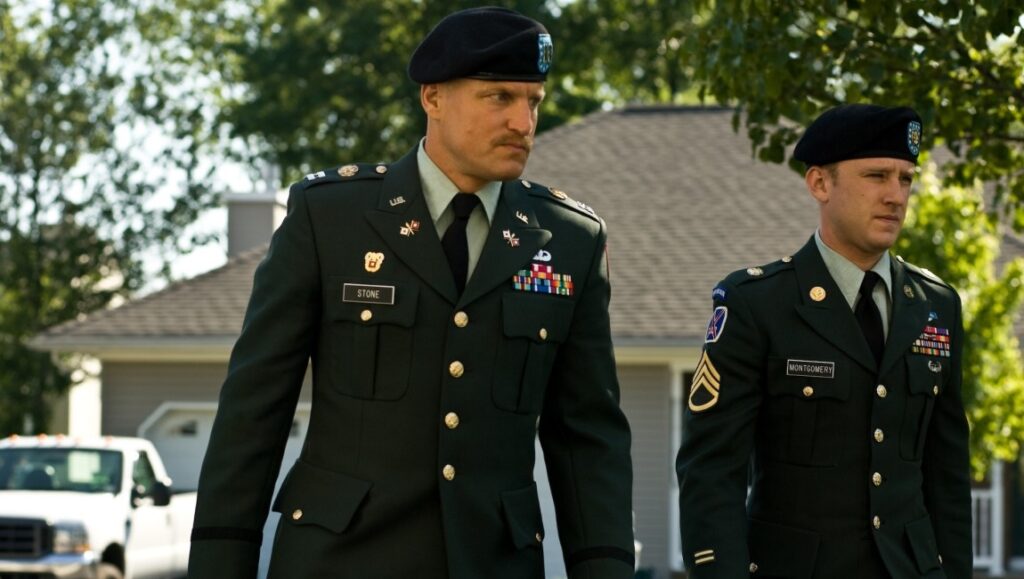Oren Moverman’s quietly moving wartime drama The Messenger arrives just months after the release of Kathryn Bigelow’s much-hyped action-drama The Hurt Locker, two thematically similar, yet stylistically opposed films. Both attempt (and arguably succeed) to communicate the immense emotional heft and psychological toll of the ongoing Iraq War. In Bigelow’s case, this was achieved by following a bomb diffusion squad through an episodic series of missions in and around Baghdad, and by favoring an aesthetic charged with jittery, adrenaline-inducing visual effects. In contrast, Moverman’s approach is far more subdued, as his film takes place away from the war zone, back on U.S. soil, yet is no less impacted by the conflict.
The charge of The Messenger is one of subtlety, engaging us with the characters and their emotions through stolen glances and wordless embraces, an understatement reminiscent of this year’s other great American drama, James Gray’s Two Lovers. Staff Sergeant Will Montgomery (3:10 to Yuma‘s Ben Foster) is told, after serving his time in Iraq, that he must spend his last few months working for the army’s Casualty Notification Service. He’s partnered with Woody Harrelson’s stringent Captain Tony Woods, and we begin to see both men’s psyches tested and defined by their difficult assignment. Early on, Will is tasked with informing Olivia (Samantha Morton) of her husband’s death, and the soldier’s intentions ever so slightly shift, as he begins to develop a crush on the recently-widowed working mom. A filmmaker with great instincts, Moverman allows his sturdy craft to support his emotionally-engaging story. His camera inhabits the same space of his two central characters, Will and Tony, suggesting a third party flitting between them, and favoring primarily long, static takes — used particularly effectively during one conversation between Will and Olivia in the film’s final third. Only when his calculatedly stoic protagonists find their resolve tested does the director echo their turmoil by allowing his camera to move and rove with similar discontent.
This enforces the idea that The Messenger is a film strictly dictated by the temperament of its characters. Or, to put it more accurately, The Messenger is an actors’ showcase, with all three leads giving some of the year’s best performances. Foster expertly grapples with Will’s deep-seated emotional imbalance, tapping into a steadfast humanism, evidenced in tortured stares that convey the stewing anguish within. Harrelson, though in a sense retreading the characteristic schtick we’ve seen from him in countless roles, tones down his more zany gestures and eccentric line-readings to become, fittingly, a more patriarchal figure in the film, one devoted to living up to others’ perceptions of him. The character Moverman has written is perhaps more finely drawn than Harrelson’s rendering of him, but the restraint the actor brings to the role shows a willingness to be guided by material, rather than dominate it. And then there’s Samantha Morton. There’s no actress more versatile working in Hollywood today. Morton displays yet again a tact and carefulness in the characterization of her trailer-park-raised single mom, Olivia. And unlike other actresses with similar parts this year (I’m looking at you, Michelle Monaghan in Trucker), Morton never condescends to or judges her character, finding the emotional core of Olivia and giving a stirring yet natural performance that becomes the calming, soulful center of The Messenger.
There are very few flaws to speak of in the film, but one near the end very nearly causes it to fall victim to a claptrap of Hollywood convention. Will and Tony make a spur-of-the-moment decision to travel south and attend the wedding of Will’s old flame (Jena Malone). At the rehearsal dinner, Will gives an awkward, uncharacteristic toast to the bride-to-be, and his actions seem at odds with the way Moverman and Foster have established the character—otherwise precise and believable throughout. Further, there’s no fallout for this scene, no consequence for Will’s recklessness. Instead, however, Moverman carries on briskly, and by the time The Messenger reaches its enormously wrenching finale, we’ve easily forgotten about this minor misstep.


Comments are closed.